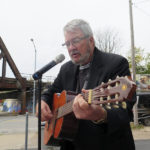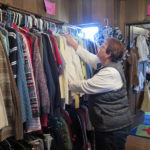A husband candidly admitted in a videotaped interview that his abusive behavior toward his wife nearly ended their marriage. Through a program in a Chicago parish, the husband realized that most of the things he was doing that he thought were right were actually wrong. The parish’s pastor knew that domestic violence is a problem many families struggle with and that the church must minister to people where they are at. In the midst of Domestic Violence Awareness Month, we as the church can do no less; we are the field hospital that Pope Francis so vividly describes, caring for the wounded.
One in four women and one in seven men are victims of domestic violence in their lifetime in the U.S. Eighty-five percent of domestic violence victims are women. Victims become paralyzed with fear, unable to extricate themselves from the cycle of violence. Sometimes they die. Domestic violence knows no boundaries: religious, socioeconomic, racial, etc.
The Catholic bishops of the U.S. have spoken out against domestic violence since at least 1992, when they issued a statement titled “When I call for help: A pastoral response to domestic violence against women.” The bishops reaffirmed that statement in 2002 and called on the Christian community to work vigorously against domestic violence.
Our church takes part in Domestic Violence Awareness Month “because we know that it touches individuals and families in all sectors of society, including families who are members of our parishes and whose children are enrolled in our schools and programs,” Cardinal Donald Wuerl of the Archdiocese of Washington, D.C., said in a 2014 blog. “The Church is here to help all those who are affected — victims as well as perpetrators. God’s merciful love can reach into the darkest places of relationships and family life.”
Victims and abusers require professional assistance; that’s the first priority. They need assurance that their church family cares about them and will support them in whatever ways possible as the Chicago parish demonstrated for the couple who overcame domestic violence. But victims also need to know the church supports their decision to leave an abusive relationship that puts the family at risk.
The Davenport Diocese does not provide programming for victims or abusers of domestic violence, but could perhaps look to collaborating with other neighboring dioceses. Our diocese does offer a resource list addressing domestic violence and it is available on the diocesan website http://www.davenportdiocese.org/dcn/dcnacademics.htm#DomViolence.
Other really good resources include a free, downloadable booklet “How Can We Help to End Violence in Catholic Families: A Guide for Clergy, Religious and Laity” (www.paxinfamilia.org) by psychologist Christauria Welland; and the National Council of Catholic Women’s resource manual “Women Healing the Wounds” which can be downloaded at http://tinyurl.com/nlquf2k. Both booklets provide excellent advice for everyone — victims, abusers and people who simply care — about preventing and dealing with domestic violence. Before you get too concerned that we’re being soft on abusers, consider this observation by Dr. Welland who has years of experience working with victims and abusers:
“When you work with the abuser, you actually have an opportunity to help that person to change and as a result for the family to become a much happier place and a holier place.…” (Catholic News Service, 9-24-15)
So, what can we do as individuals in our parishes? Read the aforementioned booklets and other resource materials about domestic violence to be able to recognize and respond pastorally toward people in need of help. Examine our consciences at the end of each day, reflecting on how we treat our spouses or other loved ones. Lobby Iowa legislators to provide adequate funding for programs addressing domestic violence. Work toward systemic change that makes it possible for heads of households to be able to support their families with living-wage jobs, adequate health care and day care for children. That will relieve pressure that can take families to the breaking point.
Barb Arland-Fye











